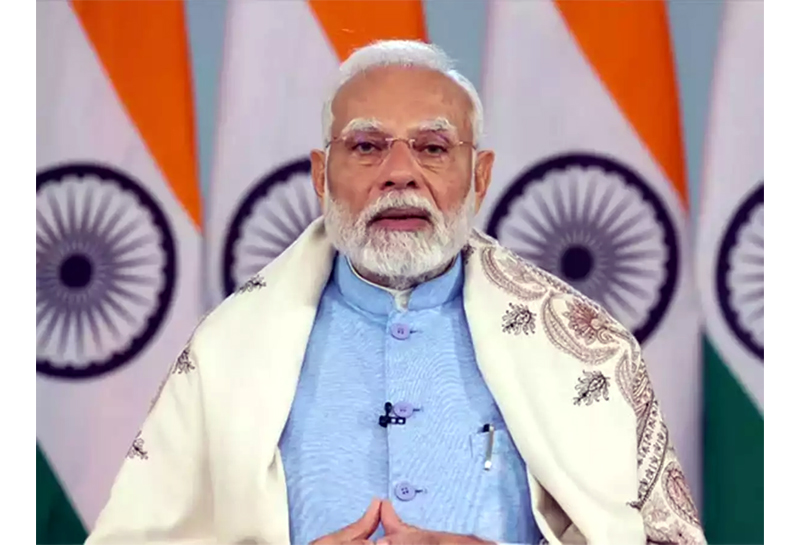NEW DELHI, Jan 17: On Friday, Prime Minister Narendra Modi declared that the future of mobility is rooted in India, highlighted by the record sale of 2.5 crore vehicles annually and the influx of USD 36 billion in foreign direct investment over the last four years.
During his address at the inauguration of the Bharat Mobility Global Expo 2025 at Bharat Mandapam, the Prime Minister reiterated that India is an exceptional destination for investors aiming to shape their future in the mobility sector.
The expo spans five days and takes place at three venues: Bharat Mandapam, Yashobhoomi in the national capital, and the India Expo Center and Mart in Greater Noida, showcasing over 100 new launches in automobiles, components, products, and technologies.
Scheduled from January 17-22, India’s largest auto expo will encompass the entire mobility ecosystem—from vehicle manufacturers to component suppliers, electronics producers, tire and energy storage makers, as well as automotive software companies and material recyclers—under one roof.
Modi underscored that innovation and technology drive the automotive industry, proclaiming that the future belongs to Asia and India.
“India is an excellent destination for every investor looking to envision their future in mobility,” he stated, reassuring attendees of the government’s full support and encouraging continued progress under the ‘Make in India, Make for the World’ mantra. He noted that the ‘Make in India’ initiative has significantly contributed to unleashing the growth potential of India’s auto industry.
He pointed out that the Performance Linked Incentive (PLI) schemes have revitalized the ‘Make in India’ campaign, facilitating sales exceeding Rs 2.25 lakh crore and creating over 1.5 lakh direct jobs in the sector.
“Inspired by the aspirations of our people and the vigor of our youth, India’s automobile sector is undergoing an unparalleled transformation,” he remarked, revealing that over the past year, the Indian auto industry has experienced nearly a 12 percent growth, alongside a rise in exports.
Modi noted that the number of cars sold annually in India exceeds the population of many countries.
The sale of approximately 2.5 crore vehicles per year illustrates the ever-increasing demand in India, as stated by Modi.
India stands as the world’s fifth-largest economy and the third-largest passenger vehicle market.
The Prime Minister further emphasized that as India emerges among the top three economies globally, the country’s automotive market will see tremendous transformation and expansion.
Several elements are shaping India’s mobility future, such as the large youth demographic, a growing middle class, rapid urbanization, infrastructure modernization, and the availability of affordable vehicles through the ‘Make in India’ initiative.
He pointed out that a significant consumer base is India’s middle class, with 25 crore Indians having ascended from poverty over the past decade, forming a neo-middle class eager to purchase their first vehicles.
Modi highlighted that India is constructing a mobility system that benefits the economy and the environment, aiming to reduce the fossil fuel import bill. The focus is on advancing green technology, electric vehicles (EVs), hydrogen fuels, and biofuels.
He reinforced the comprehensive support the government has extended to the auto sector at all levels, noting that the last decade has opened up new pathways for foreign direct investment, technology transfers, and global collaborations within the industry.
In just the last four years, the sector attracted over USD 36 billion in foreign direct investment, with expectations for this figure to increase in the upcoming years.
He reaffirmed the government’s dedication to creating a complete ecosystem for automotive manufacturing in India.
Modi also addressed the remarkable rise of electric mobility in India over recent years, highlighting that electric vehicle sales have surged by 640 times in the last decade.
Where only approximately 2,600 electric vehicles were sold annually a decade ago, over 16.8 lakh electric vehicles were sold in 2024.
The Prime Minister projected that the number of electric vehicles in India could balloon to eight times by the end of this decade, signifying the vast potential in this sector.
He encouraged manufacturers to leverage the vehicle scrapping policy, suggesting that companies could implement their own incentive schemes to entice more individuals to trade in their old vehicles.
Reflecting on the contributions of Ratan Tata and Osamu Suzuki, Modi acknowledged their profound impact on the growth of the Indian auto sector and on realizing the aspirations of middle-class households across India.
He expressed confidence that their legacy would continue to inspire the entire mobility sector in India.
During the event, Commerce and Industry Minister Piyush Goyal remarked that Bharat Mobility 2025 presents India’s narrative to the world, promoting investment and enhancing trade for the country.
The auto industry has emerged as a hallmark of Atmanirbhar Bharat and Make in India, and startups are also taking part in the event, he noted.
The minister shared that India has become the world’s leading manufacturer of three-wheelers and tractors, as well as the largest two-wheeler market globally.
Union ministers Nitin Gadkari, Manohar Lal, H D Kumaraswamy, Jitan Ram Manjhi, and Hardeep Singh Puri were also present among other distinguished guests at the event. (PTI)


Leave a Reply